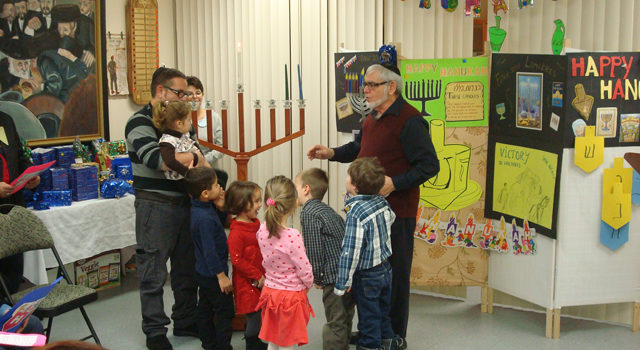The organization that brought together the small Jewish population on the South Shore of the Montreal suburbs for nearly three decades is disbanding, a casualty of not only the pandemic but an inability to attract younger people.
The board of directors of the South Shore Jewish Community (SSJC), founded in 1994 and which at its peak had over 130 member families, has decided it is better to wind up operations now rather than continue to deplete its modest remaining assets.
“It’s painful, it hurts, but we have no choice,” president Jacques Saada said. “The generation that founded the SSJC is dwindling. Despite our tremendous efforts, we were never able to attract a new generation.”
The SSJC, which has its centre in a La Prairie strip mall, resumed in-person events this fall when COVID restrictions were relaxed, but the response was disappointing.
Saada, president since 2013, said members have moved away over the years or chosen to connect with the Jewish life in Montreal. With no Canadian census data later than 2011, it is hard to say how many Jews are in the area today. Young families are known to have moved there, including those of South American and Russian origin.
Saada said the SSJC reached out to these newcomers without success.
Secretary Rosalie Hodson, who joined a year after the founding, said the SSJC has been like family and its end is heartbreaking, but inevitable.
“Most members are in their 70s. The entire responsibility falls on half a dozen elderly people,” she said. “The pandemic has been devastating. Unable to hold any events or raise funds, we have still had to pay for all the costs of the community centre.”
The SSJC is entirely volunteer, unaffiliated with any denomination or movement, and never aimed to be a synagogue. For very low membership fees, it provided cultural and social programming, as well as holiday observances, sometimes led by guest clergy.
With a territory stretching from the St. Lawrence River to the U.S. border, the SSJC has from the beginning valued inclusivity. Ashkenazim and Sephardim, secular and traditional, recent immigrants and the Canadian-born, people of modest means and the more comfortable, all found fellowship.
Many were interfaith families, and the SSJC welcomed them if at least one adult member was Jewish, however they may define it.
“The obstacles were countless—geographic dispersion, management of language and diversity—yet against all odds, we succeeded and this is matter of great pride,” said Saada, who was a Liberal MP and cabinet minister from 1997-2006.
In recent years, the SSJC has been affiliated with the Communauté Sépharade Unifiée du Québec, of which Saada is also president, and maintained ties with Federation CJA, which gave it an annual $5,000 grant. Saada does not think that these organizations could have done more to keep the SSJC going.
The SSJC’s origin story is legendary. In the early 1990s, longtime resident, the late Walter Lee, who thought he was the only Jew on the South Shore, one day spotted an obvious Hasid at a local store. Lee asked him if he lived nearby.
The answer was no, but the Lubavitcher was interested that Lee did, and maybe other Jews did as well. Newly retired, Lee and the Hasid tracked them down, going through the telephone directory looking for Jewish-sounding names and making cold calls.
The SSJC first met in the common room of Lee’s Brossard condo in 1994—the space was full—and a year later the SSJC was incorporated as a charitable organization.
Chabad-Lubavitch was also on the South Shore a decade ago, led by Rabbi Zalman Samama working from his home. Chabad of the South Shore opened its own centre in Brossard three years go.
There has been collaboration between Chabad and the SSJC and some of the latter’s members take part in its activities, but Saada said, “For sure, (the SSJC’s decline) is not because of Chabad; they have had the same difficulties we have in terms of recruitment.”
Despite its small size, the SSJC has had an outsized presence in inter-religious and intercultural relations on the South Shore, said Jonathan Slater, a New York City native who led such efforts, particularly with the Roman Catholic diocese.
Tunisian-born Saada had contacts in the Muslim community.
The SSJC annual gala, to which the Israeli consul general was always invited, drew more non-Jews than Jews. At the last one in November 2019, Saada said there were 21 SSJC members among a total of 175 guests from an array of communities and all government levels.
The lease on the SSJC centre runs to June. The few remaining members have to decide how to dispose of its valuables. Notably, there is an ark and bimah, and a Torah donated by a synagogue that was closing in Melfort, Sask. Hodson recalls that Lee drove out there to accept it.
The sum expected to be in the bank when the dust settles—maybe $30,000 to $35,000—will be put to good use. One idea is to set up a fund in Lee’s memory that would benefit the broader Jewish community.






